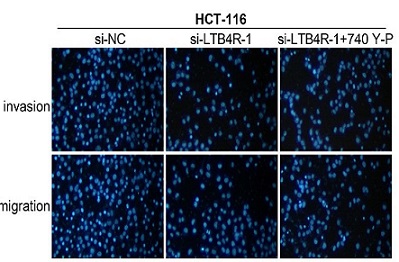Leukotriene B4 receptor knockdown affects PI3K/AKT/mTOR signaling and apoptotic responses in colorectal cancer
DOI:
https://doi.org/10.17305/bb.2024.10119Keywords:
Leukotriene B4 receptor (LTB4R), colorectal cancer (CRC), phosphoinositide 3-kinase/protein kinase B/mammalian target of rapamycin (PI3K/AKT/mTOR) signaling pathway, apoptosisAbstract
Colorectal cancer (CRC) presents a landscape of intricate molecular dynamics. In this study, we focused on the role of the leukotriene B4 receptor (LTB4R) in CRC, exploring its significance in the disease's progression and potential therapeutic approaches. Using bioinformatics analysis of the GSE164191 and the Cancer Genome Atlas-colorectal adenocarcinoma (TCGA-COAD) datasets, we identified LTB4R as a hub gene influencing CRC prognosis. Subsequently, we examined the relationship between LTB4R expression, apoptosis, and the phosphoinositide 3-kinase/protein kinase B/mammalian target of rapamycin (PI3K/AKT/mTOR) signaling pathway through cellular and mice experiments. Our findings revealed that LTB4R is highly expressed in CRC samples and is pivotal for determining prognosis. In vitro experiments demonstrated that silencing LTB4R significantly impeded CRC cell viability, migration, invasion, and colony formation. Correspondingly, in vivo tests indicated that LTB4R knockdown led to markedly slower tumor growth in mice models. Further in-depth investigation revealed that LTB4R knockdown significantly amplified the apoptosis in CRC cells and upregulated the expression of apoptosis-related proteins, such as caspase-3 and caspase-9, while diminishing p53 expression. Interestingly, silencing LTB4R also resulted in a significant downregulation of the PI3K/AKT/mTOR signaling pathway. Moreover, pretreatment with the PI3K activator 740Y-P only partially attenuated the effects of LTB4R knockdown on CRC cell behavior, emphasizing LTB4R's dominant influence in CRC cell dynamics and signaling pathways. LTB4R stands out as a critical factor in CRC progression, profoundly affecting cellular behavior, apoptotic responses, and the PI3K/AKT/mTOR signaling pathway. These findings not only shed light on LTB4R's role in CRC but also establish it as a potential diagnostic biomarker and a promising target for therapeutic intervention.
Citations
Downloads

Downloads
Published
Data Availability Statement
The datasets used and/or analyzed during the current study are available from the corresponding author upon reasonable request.
Issue
Section
Categories
License
Copyright (c) 2024 Cui Tang, Aili Wang, YanLin Zhao, WenYing Mou, Jun Jiang, Jie Kuang, Bin Sun, Erjiang Tang

This work is licensed under a Creative Commons Attribution 4.0 International License.
How to Cite
Accepted 2024-01-12
Published 2024-01-20









